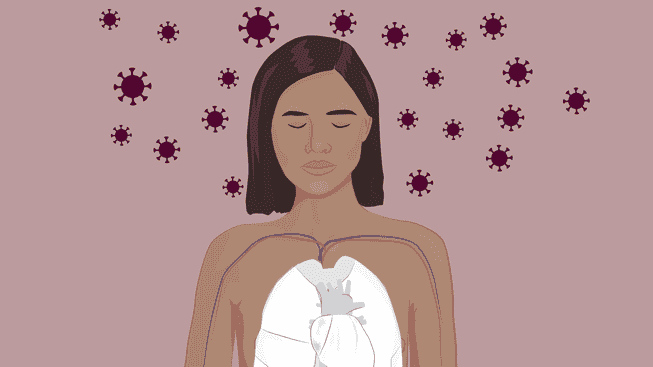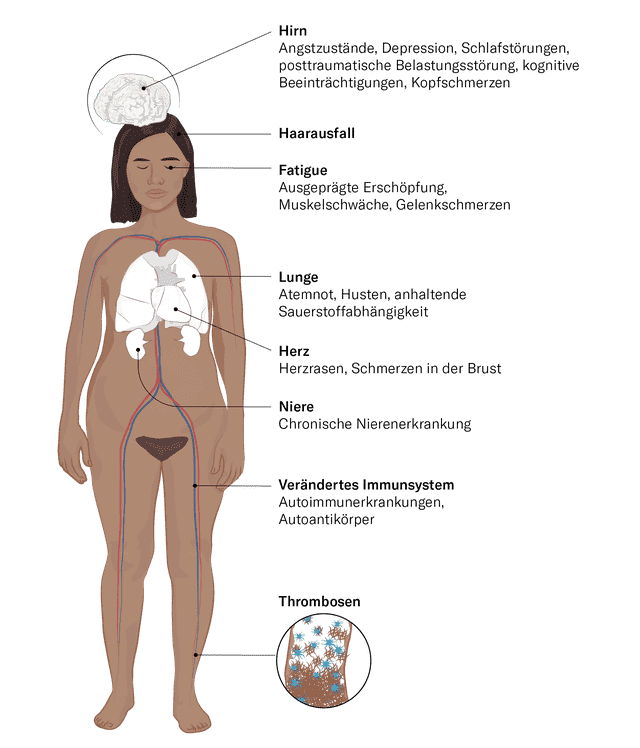What exactly is behind the term Long Covid? What risk factors are there? We answer the most pressing questions.
Pronounced exhaustion, also called fatigue, is a common symptom of Long Covid.
A late consequence of the corona infection worries many people and puzzles science: Long Covid. Those affected have in common that they suffer from consequential damage after recovering from Covid disease, which makes it difficult or impossible for them to return to everyday life. New findings were presented and therapy ideas discussed at a congress in Jena in November.
When do you speak of Long Covid?
There are now two definitions. Doctors speak of a long-Covid illness if the symptoms persist more than four weeks after the acute infection. If the problems are still there after twelve weeks or if new symptoms have appeared, then experts call this post-Covid syndrome. Neither the number of symptoms nor their severity are decisive for the diagnosis.
What are the typical symptoms of Long Covid?
There is a very long list. The symptoms most frequently mentioned in studies are shortness of breath, pain in different parts of the body, pronounced exhaustion, also known as fatigue, reduced physical performance, cough, cognitive impairments such as difficulty concentrating or forgetfulness and persistent disorders of the sense of smell and taste. But diarrhea, kidney problems, cardiac arrhythmia and blood clotting disorders as well as hair loss are also regularly reported. This shows that a large number of organs can be affected, in some cases several at the same time.
The duration and severity of Long Covid and the resulting impairments in daily life vary greatly. There are those patients who, even after more than a year, can only move around with the walker or cannot talk and stand at the same time. And at the other end of the scale there are long-Covid sufferers who “only” have a cough, chest pain and limited fitness for a few weeks.
How many Sars-CoV-2 infected people develop Long Covid?
Here the information differs widely. The spectrum ranges from 10 to 80 percent, hospital patients as well as others were observed. Speakers at the Jena Congress assume that only three out of ten Covid sufferers are fully fit again after a year and feel just as good as before.
The data available so far show that the more severe the Covid-19 disease was, the higher the risk of long Covid. Of those who recovered from Covid-19 at home, less than 1 percent continued to report symptoms a year after infection. In contrast, there were around 21 corona patients in intensive care and 11 percent in those who “only” had been hospitalized.
However, data in the individual studies and also in different countries vary considerably. For one thing, Long Covid is not clearly defined. On the other hand, the group of asymptomatic and therefore often undiagnosed patients is difficult to quantify. Therefore, it is currently not known how many of these people will develop Long Covid or Post Covid.
Do children have long covid too?
Doctors believe yes, but less often than adults. New studies by groups from Dresden and Geneva show that up to ten percent of older children and adolescents develop Long Covid in the first few months after the corona infection. Children under the age of ten were rarely affected. According to the Dresden study the children suffered mainly from tiredness and exhaustion, coughing and sore throats and chests. Mental problems were also somewhat more common than in adults – which, however, could also have been due to the general pandemic situation, experts warn. The team from Geneva determined that the main problems were stomach, muscle and headaches, as well as poor concentration and loss of smell.
Do you know the triggers of Long Covid?
Some. Severe symptoms after a corona infection can be at least partially due to a severe course of the disease. This is the case when those affected suffer organ damage, such as scarring in the lungs or heart or impairment of kidney function.
A big mystery for doctors and therapists is how loss of concentration, low physical and mental resilience or fatigue occur, for which no organ damage can be proven. It is also inexplicable why these diseases can also occur after a mild Covid 19 illness.
More and more experts are demanding that you have to take off your specialist glasses and realize that there are very different forms of long covid, each with different causes. There must therefore be detailed, individual diagnostics and therapy.
In some of those affected, persistent derailments of the immune system cause the symptoms. Studies have shown that both the immune cells responsible for fighting pathogens and those responsible for calming down the situation after the acute phase of combat no longer function properly. Presumably too few viruses are eliminated first. Then there is a kind of permanent inflammation. In addition, virus particles remaining in the body could put the body in a sustained state of alarm and contribute to the long-term inflammation.
In some of those affected, an increased amount of so-called autoantibodies was found after the corona infection. These attack cells in various tissues. Organ damage occurs. Currently, however, the majority of researchers assume that Long Covid is not always an autoimmune disease.
Blood coagulation disorders have developed in other long Covid patients after the corona infection. Huge amounts of tiny clots are formed, which get caught in the terminal branches of the bloodstream and, as it were, cut off the air in the tissues.
It is also being discussed whether Sars-CoV-2 can wake up other viruses that are dormant in the body, such as herpes viruses. The immune system, exhausted by the corona infection, cannot withstand this new onslaught. Thus, the awakened viruses can cause organ damage. Last but not least, harmful changes in the brain, such as the loss of nerve cells after a corona infection, have been identified. And there are indications that the corona viruses mess up the intestinal flora.
What therapies are there?
In most cases of organ damage, the consequences can at least be mitigated with specific therapies. Muscle weakness, caused by lying in hospital for a long time, or swallowing and breathing difficulties after artificial respiration, can also be remedied with targeted muscle training.
However, standardized treatments for fatigue and many of the other symptoms are lacking. For some of those affected, blood washing or substances that specifically block autoantibodies helped. For the time being, such treatments have only been tested in a few patients as an experimental therapy. Clinical studies are currently being prepared. Other patients benefit from energy management or breathing therapies or from psychotherapeutic approaches. There are now clinics that specifically deal with long covid relief.
Do you know any risk factors for Long Covid?
Meanwhile: yes. The team from the University Hospital Zurich found out that older age, severe Covid 19 disease and asthma increase the risk of developing Long Covid. In addition, the equipment of the immune system plays a major role. If those affected produce certain inflammatory stimulators in higher quantities but some types of antibodies in lower concentrations during the acute Sars-CoV-2 infection, their risk of long Covid increases significantly.
Type 2 diabetes, an Epstein-Barr infection or the amount of Sars-CoV-2 ingested are also loud US researchers from Seattle Risk Factors for Long Covid. People who already have certain autoantibodies before they are infected are also at risk. These data suggest that abnormalities in the immune system play an important role in the development of Long Covid. Some studies report that it affects more women than men.
Does vaccination prevent Long Covid?
Only partially. Virologists explain that the vaccination protects at least some people from Long Covid as follows: A vaccination does not always prevent an infection. But it reduces the amount of virus particles circulating in the body and thus the risk of severe Covid 19 disease. According to the current state of knowledge, vaccination is not a therapy against the post-Covid syndrome.

